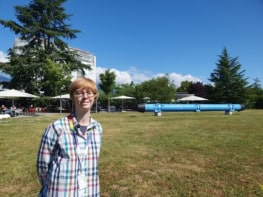Mike DeArmond is a sales engineer for SIGMA Surface Science. He works with researchers to define and provide solutions for experimental programmes focusing on materials, condensed matter and surface science

What sparked your initial interest in physics?
I originally studied mechanical engineering, where we had an elective lab associated with my modern physics course that revolved around gamma-ray spectroscopy. This, combined with a gentle nudge from the professor who would become my adviser, led me to change to physics. One aspect of the lab was a series of mock poster sessions where we had to defend our work to a panel of professors. Being a department centred on physics education, the demand on explaining the underlying physical details of an experiments was high, and it was that challenge that pushed me to learn the subject better. Around this same time, I began lingering around my soon-to-be lab, peeking in and asking questions. This led to my first research project, which included resurrecting old equipment and building up apparatus from scratch. I think for a lot of students this is where they fade out and quit, but I revelled in it. Those early challenges represent some of my most satisfying lab experiences.
Did you ever consider an academic career?
My Master’s degree was focused on thin films, and constructing and characterizing an atmospheric atomic-force microscope using a tuning-fork sensor. I was totally new to all of nanotechnology so it was a bit like being back at square one. I pivoted during my PhD, which was based around multiphoton fluorescence microscopy and ultrafast laser generation. I began graduate school with the singular goal of entering academia upon finishing. During my studies, however, I was introduced to a number of previously unknown career pathways through my peers and various academic collaborations
How did you get into instrumentation?
From the outset, my experimental work depended on me designing and building my own equipment, and I quickly learned the benefit of understanding how the tools I was using worked. Combined with the mock poster sessions, I gained an appreciation for the experimental equipment in the lab. I think there’s a benefit to working with a limited budget, which forces you to make something from scratch and inspires you to build things and build them better. We didn’t have off-the-shelf equipment, so I had to make my first controller from a circuit design tool, then print and etch it, solder the components and programme the microprocessor. I even had to build the box. Each step was something brand new to me, but that only made it more satisfying. When I went on to graduate school and worked in a lab that specialized in these efforts, my admiration for what was required for this sort of work was multiplied many times over.
What were some of the challenges in moving from academia into a business role?
Prior to taking my current role, I had never considered the costs associated with manufacturing a product. As a student making equipment from scratch, there is no consideration for someone making the same thing at a later date, and little outside of a lab notebook regarding documentation. Entering a sales position confronted me with what seemed like a strange maze of suppliers, costs, reliability, market and currency fluctuations, to say nothing of the engineering work that goes into each system or product.
What are some of your day-to-day responsibilities as a sales engineer at SIGMA Surface Science?
To my surprise, I probably read more journal articles today than I did as a graduate student. My role involves having a good understanding of the current literature and being aware of trends in a wide range of disciplines. The scientific advances that I now need to be familiar with are across a much larger scope than the singular focus you have as a graduate student.
How has your physics background been helpful in your work, if at all?
I think a physics background’s benefit always boils down to the ability to problem solve. We are trained (sometimes unknowingly) to look at complex and multifaceted problems; quickly understand the underlying principles; and develop an approach to solve the problem. Something I often find myself tapping into is my ability and tendency to do approximations, to assess whether a certain experiment or approach is feasible at all. As a physicist, you often do back-of-the-envelope calculations to get a sense of a broader topic.
Any advice for today’s students?
Two things. First, I’d say it’s important to realize that there are no boundaries as to where you can take your career, if you have built it on the foundation of physics. I offered a challenge to a group of undergraduate students to go to the jobs page of any national or international company they could think of (starting with tech companies) and search using the keyword “physics” to see how many positions pop up. The fact is that the tool-set provided by a physics education is highly valued and widely recognized, for good reason. Second, don’t stop learning. When presented with a new challenge, don’t be afraid to take it on and expand your knowledge and experience base. As long as you aren’t significantly deviating from your academic programme, you should chase these opportunities.



